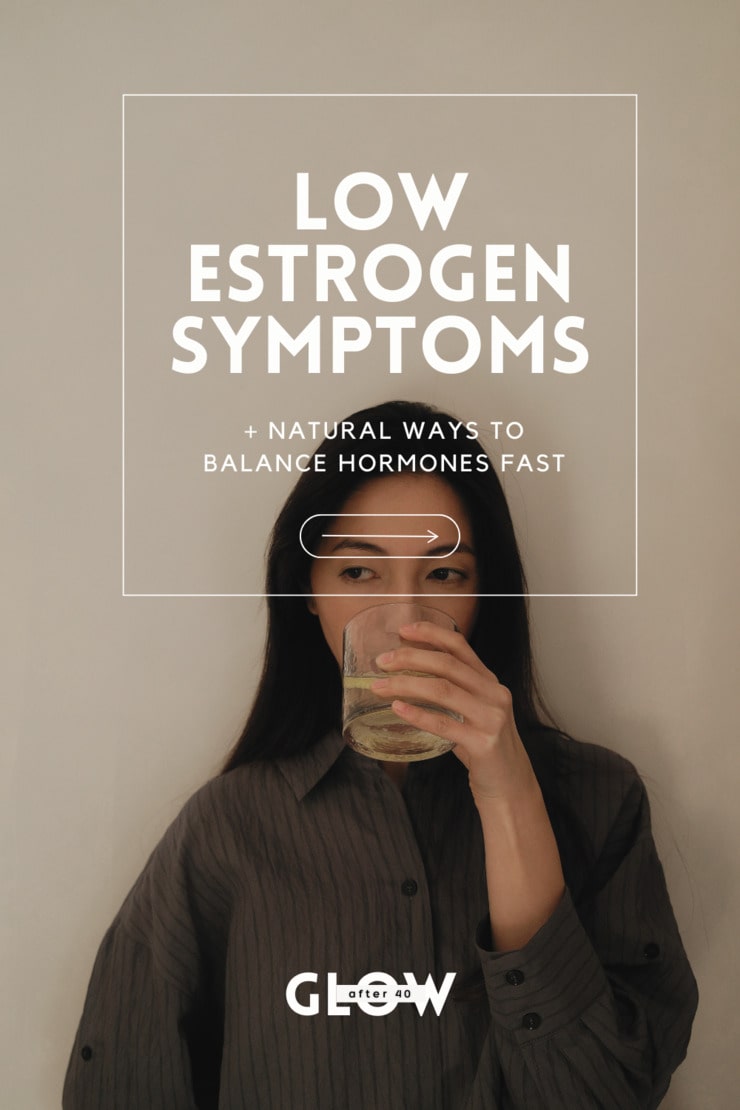Low estrogen symptoms can leave you feeling exhausted, moody, and unlike yourself – but there’s hope. This guide shows you how to increase estrogen naturally through estrogen rich foods and herbs and lifestyle changes that actually work, helping you feel vibrant and balanced again.
Hey beautiful,
I see you.
I see you waking up at 3 AM drenched in sweat.
I see you staring at your reflection wondering where your energy went.
I see you feeling like a stranger in your own body.
If you’re over 40, you’re probably wondering: Is this just me getting older?
No, my dear. This is your hormones changing. And you’re not alone.
Luckily, I have an incredible friend who’s a naturopath. She’s been my guide through all of this. Teaching me the gentle, natural ways to support our changing bodies. Everything I’m sharing with you comes from her wisdom – and my own journey of testing it all.
The Signs Your Body is Whispering (Or Screaming)
Your body has been trying to tell you something. Maybe for months. Maybe for years.
The physical signs:
- Hot flashes that make you want to live in a freezer
- Sleep that feels impossible to catch
- Periods that show up whenever they feel like it
- Joints that ache like you ran a marathon (but you didn’t)
- Weight that clings to your middle no matter what you do
- Skin and hair that feel dry and tired
The emotional rollercoaster:
- Mood swings that surprise even you
- Brain fog that makes you forget your own name
- Anxiety that wasn’t there before
- A libido that packed its bags and left
Experience it too?
You’re not losing your mind. You’re not falling apart.
Your estrogen is just taking a little vacation.
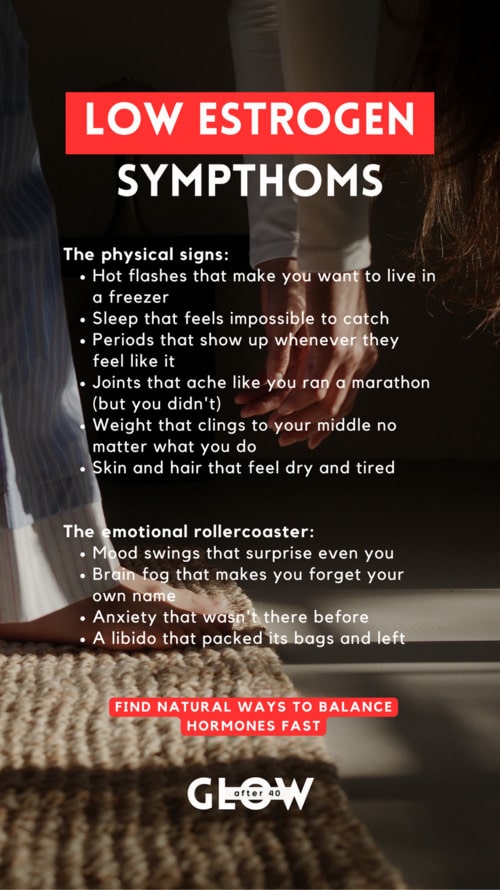
Why This Happens to Us
Here’s the thing nobody tells you about being a woman over 40:
Your ovaries start getting tired. They’ve been working for decades. Producing eggs. Making hormones. Keeping everything balanced.
Around 40, they start slowing down. Estrogen begins its gentle (or not so gentle) decline.
This usually happens in three stages:
- Perimenopause (30s-40s): Your hormones start their dance of ups and downs
- Menopause (around 50): Your periods stop completely
- Post-menopause: Your new normal begins
But sometimes life throws curveballs. Stress. Surgery. Illness. These can speed things up.
The point is: This is normal. This is natural. This is not your fault.
What Your Body Needs Right Now
Listen, honey. I totally get it.
Three kids. Busy life. Feeling like my body betrayed me.
But here’s what I learned:
Your body isn’t broken.
It just needs different support now.
1. Estrogen Food
Some foods act like gentle estrogen in your body. They’re called phytoestrogens. They act as nature’s little helpers))).
But here’s what my naturopath friend taught me: It’s not just about adding estrogen-like foods. It’s about helping your body use the estrogen you still make.
Even in perimenopause, your body is still producing some estrogen. The problem? Sometimes it can’t use it properly. Or it’s getting broken down too quickly. Or it’s being blocked by inflammation.
So we need a two-part strategy:
1) The Phytoestrogen Foods:
- Soy (tofu, miso, tempeh) – don’t believe the fear stories. Quality soy has been safely used for thousands of years
- Flaxseeds – grind them fresh, sprinkle on everything. They’re like little hormone angels))
- Chickpeas and lentils – your protein powerhouses that also balance blood sugar
- Pomegranates and berries – sweet medicine packed with antioxidants
- Sesame seeds – tiny but mighty, especially as tahini
2) The Estrogen Detox Foods: Here’s something most people don’t know:
Certain vegetables help your body get rid of “bad” estrogen and keep the “good” estrogen.
- Broccoli and Brussels sprouts – these contain something called DIM that helps your liver process hormones properly
- Cauliflower and cabbage – same family, same benefits
- Kale and arugula – bitter greens that support liver detox
- Bok choy and collard greens – gentle but powerful
Why this matters: When your liver can’t process estrogen properly, you get symptoms even if your levels aren’t that low. These foods really give your liver a gentle spa day.
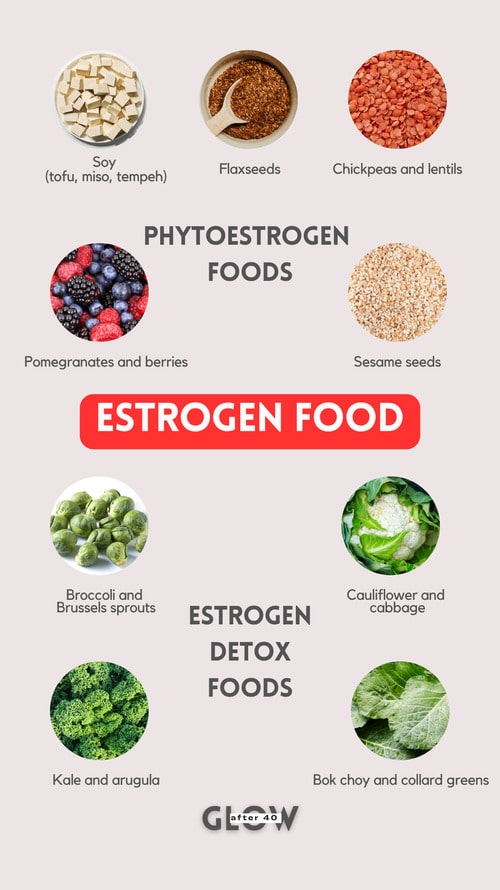
The Blood Sugar Balancers: When your blood sugar spikes, it messes with ALL your hormones. These foods keep everything steady:
- Sweet potatoes and squash
- Quinoa and brown rice
- Avocados (yes, every day if you want)
- Nuts and seeds (especially pumpkin seeds for zinc)
One simple swap: Replace your morning toast with a smoothie. Berries, ground flaxseed, spinach, nuts and yogurt for additional protein. Your hormones will thank you. But more importantly, you’ll feel the difference in your energy within a week.
2. Movement That Heals
You don’t need to kill yourself at the gym.
But here’s what I learned: The right exercise actually tells your body to make more hormones.
Your body needs gentle strength now. But it also needs to know you’re still vital. Still strong. Still worth investing hormone energy in.
- Weight training 2-3 times a week – this is non-negotiable. When you lift weights, your body thinks “She needs to be strong! Better make some hormones to support those muscles!” Even light weights count.
- Walking in nature – there’s something magical about moving your body outside. Fresh air reduces cortisol (stress hormone). Lower stress means more resources for making estrogen.
- Yoga that calms your nervous system – not the heated, intense kind. The gentle, restorative kind. It tells your body it’s safe. And safe bodies make hormones.
Why movement matters for hormones: When you move regularly, you improve insulin sensitivity. Better insulin = better hormone production. You also improve circulation, which helps deliver nutrients to your ovaries. And you reduce inflammation, which can block hormone receptors.
Movement isn’t punishment for your body. It’s a love letter.
Here’s my secret: The best exercise is the one you’ll actually do. Start with 10 minutes. Build from there. I used to think I needed hour-long workouts. Now I know that 20 minutes of movement I enjoy beats an hour of torture any day.
3. Sleep Like Your Life Depends On It
Because it does.
Here’s something that blew my mind when my naturopath friend told me:
90% of your hormone production happens while you sleep.
The sleep-hormone connection: When you sleep well, your body makes growth hormone (keeps you looking young), balances cortisol (reduces stress), and gives your ovaries the rest they need to produce whatever estrogen they can.
Think about it. If you’re only getting 5-6 hours of broken sleep, you’re only giving your body half the time it needs to make the hormones that keep you feeling human.
Your hormones repair and balance while you sleep. No sleep = no healing. It’s that simple.
But here’s the thing about sleep when your hormones are changing: It becomes harder to fall asleep. Harder to stay asleep. You wake up feeling like you haven’t slept at all.
This isn’t in your head. Low estrogen affects your body’s ability to regulate temperature and produce melatonin.
So what to do?
- Try magnesium before bed. It effectively soothes your nervous system and allows you to FINALLY sleep. Start with 200mg and see how you feel. This one really helped me with my sleep issues.
- Make your bedroom sleep-ready:
- Cool (around 65-68°F) – hot flashes hate cool rooms
- Dark (blackout curtains or eye mask) – light blocks melatonin
- Quiet (earplugs or white noise) – your nervous system needs peace
- No phones after 9 PM – blue light is melatonin’s enemy
- Protect your sleep like you protect your children. It’s that important.
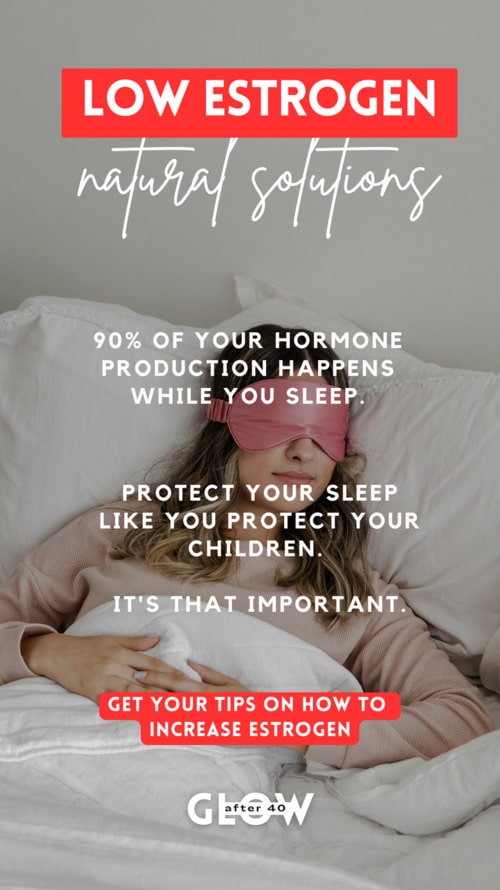
4. The Stress Connection
Stress is estrogen’s enemy.
But not just the obvious stress. The hidden stress too. The stress of saying yes when you mean no. The stress of perfectionism. The stress of putting everyone else first.
When you’re constantly stressed, your body steals resources from making estrogen to make cortisol instead. It’s like your body is saying “We’re in survival mode! No time for reproductive hormones!”
Here’s what stress does to your hormones:
- It uses up the same building blocks your body needs for estrogen
- It creates inflammation that blocks hormone receptors
- It disrupts sleep (see above for why that’s terrible)
- It makes you crave sugar, which creates blood sugar chaos
The stress-estrogen spiral: High stress → low estrogen → more symptoms → more stress → even lower estrogen. Breaking this cycle is crucial.
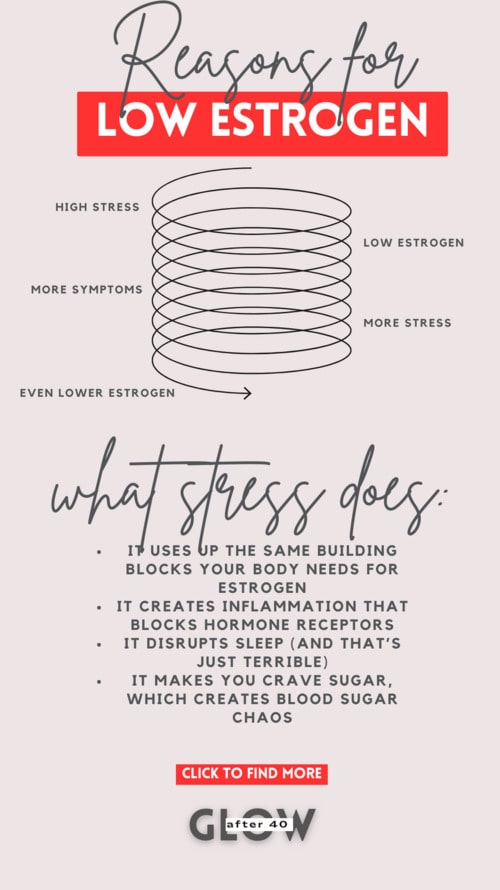
Simple stress busters that actually work:
- Deep breathing for 5 minutes daily – sounds too simple, but it literally changes your nervous system
- Say no to things that drain you – this is self-care, not selfishness
- Ask for help (yes, really) – you don’t get extra points for doing everything alone
- Find something that makes you laugh – laughter is medicine for your hormones
- And again – magnesium effectively soothes your nervous system, just try it.
My favorite stress hack: When I feel overwhelmed, I put my hand on my heart and take three deep breaths. It tells my nervous system “We’re safe. We can relax.” Try it right now.
5. Smart Supplementation Strategy
Sometimes food and lifestyle aren’t enough. And that’s okay.
Here’s what my naturopath friend taught me:
Think of supplements as insurance for your health while your body adjusts to its new normal.
The right supplements can bridge the gap. Make the symptoms manageable. Give your body the building blocks it needs to produce whatever hormones it can.
The Essential Five:
- Vitamin D3: Most women over 40 are deficient. Vitamin D isn’t just for bones – it’s actually a hormone that helps your body make other hormones. Test your levels first, but chances are you need more than you’re getting.
- B-Complex (especially B6, B12, and folate): These are like spark plugs for hormone production. B6 helps make progesterone. B12 supports energy and mood. Folate helps your body process estrogen safely. When you’re stressed or tired, you burn through B vitamins faster.
- Boron: This trace mineral helps your body absorb and use estrogen more effectively. And unfortunately you can’t get enough from food alone.
- Magnesium: The relaxation mineral. It calms your nervous system, improves sleep, reduces inflammation, and helps your body make progesterone. Most of us are deficient because stress depletes it.
- Omega-3 fatty acids: These reduce inflammation throughout your body, including in your hormone-producing tissues. They also support brain health, which helps with mood and memory issues.
What matters: Remember that the timing and dosage are important – check this info in my article about the most important supplements for women over 40 that are worth taking.
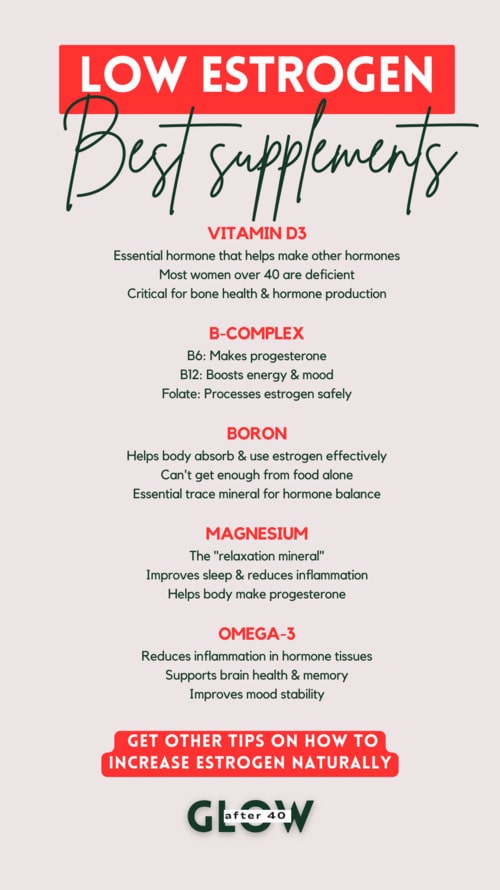
The quality question: Not all supplements are created equal. Your body deserves pharmaceutical-grade nutrients, not cheap fillers and synthetic vitamins that don’t absorb well.
Remember: Supplements support your body’s natural processes. They don’t replace healthy food, good sleep, and stress management. But when combined with lifestyle changes, they can make a real difference in how you feel.
YOU MIGHT ALSO LIKE:
Best Supplements for Women Over 40
6. Herbal Support That Actually Works
When you’re ready to go deeper, there are some incredible natural tools that have been helping women for centuries.
- Red clover: This humble plant contains not just one, but four different types of phytoestrogens. Yes, nature’s gentle hormone replacement therapy)). Studies show it can reduce hot flashes by up to 44%. The key is consistency – it takes 4-8 weeks to build up in your system.
- Black cohosh: This is the most researched herb for menopausal symptoms. Multiple clinical studies show it can significantly reduce hot flashes, night sweats, and mood swings. It works by affecting your brain’s temperature control center and supporting your body’s natural hormone balance.
- Dong quai: Known as “female ginseng” in Traditional Chinese Medicine, this root has been used for over 1,000 years to support women’s health. It helps balance hormones naturally and can improve circulation to reproductive organs. It’s especially helpful for women experiencing irregular periods during perimenopause.
- Maca root: This Peruvian superfood doesn’t contain hormones itself, but it helps your body produce its own hormones more efficiently. Studies show it can improve energy, mood, and libido in menopausal women. Plus, it supports your adrenal glands, which take over some hormone production after menopause.
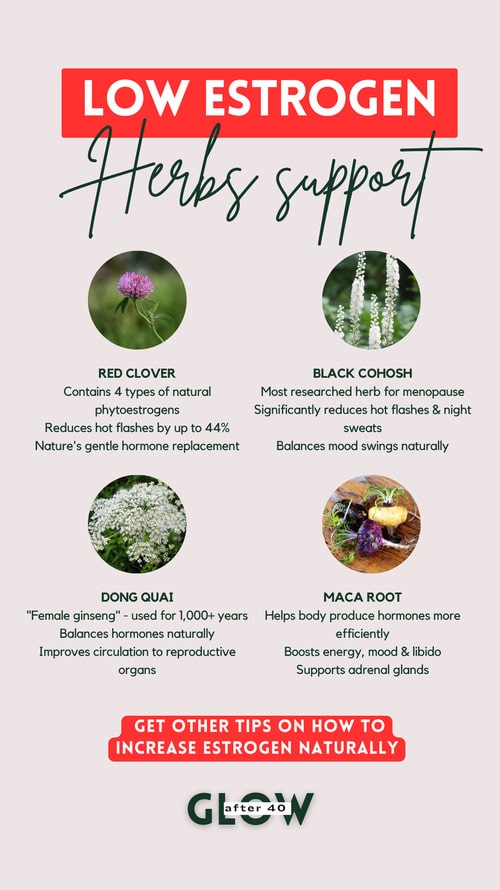
Why herbs matter: Unlike synthetic hormones, herbs work gently with your body’s natural systems. They provide support while your body learns its new normal. But quality matters – look for standardized extracts from reputable companies.
7. Gut connection
Here’s something that shocked me:
Your gut bacteria actually help create and process your hormones.
Healthy gut bacteria can convert plant compounds into active estrogen-like compounds. They also help your liver break down and eliminate excess hormones safely.
When your gut is unhealthy:
- You can’t absorb the nutrients you need to make hormones
- Inflammation spreads throughout your body, disrupting hormone signals
- Toxins build up instead of being eliminated, creating hormone chaos
Gut-healing essentials:
- Probiotics: Look for strains specifically studied for women’s health, like Lactobacillus reuteri and Lactobacillus rhamnosus
- Fermented foods: Kimchi, sauerkraut, kefir, miso – these feed your good bacteria
- Fiber-rich foods: Your gut bacteria eat fiber and produce compounds that support hormone balance
- Bone broth: Heals and seals your gut lining
The gut-hormone connection is real: When I fixed my gut health, my hormone symptoms improved dramatically. It took about 3 months, but it was worth every day of being consistent with probiotics and fermented foods.
Your Gentle Action Plan
Don’t try to change everything at once. Start small.
Small steps. Consistent action. Gentle progress.

Your 40s, 50s, and beyond can be your most vibrant years. When you finally stop apologizing for taking up space. When you prioritize your own needs without guilt.
When you realize that taking care of your hormones isn’t vanity – it’s survival.
And most importantly – be patient with the process.
Healing isn’t linear. Some days will be better than others. That’s normal.
You’re not just managing symptoms. You’re creating a new relationship with your body.
One built on love, not frustration.
Understanding, not judgment.
You’ve got this, gorgeous.
And if you need a gentle reminder of your strength, just look in the mirror. You see that woman? She’s been through so much. She’s still standing. She’s still fighting.
She’s absolutely beautiful.
With so much love and healing energy,
Sofi
P.S. Your hormones don’t define you. They’re just one part of your incredible, complex, amazing self. You are so much more than your symptoms. Never forget that.
